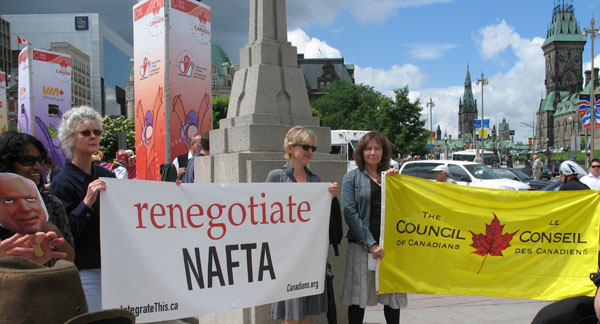Like this article? rabble is reader-supported journalism. Chip in to keep stories like these coming.
Resolute Forest (formerly known as AbitibiBowater) is launching its second NAFTA Chapter 11 challenge within five years against Canada.
The most recent challenge relates to a Cape Breton paper mill.
In August 2012, the province of Nova Scotia put $124.5 million towards helping Vancouver-based Pacific West restart the Port Hawkesbury paper mill that had been closed since September 2011.
At that time, the Chronicle-Herald reported, “[Nova Scotia premier Darrell] Dexter suggested that allowing the paper mill to remain closed would have had a devastating effect on Nova Scotia’s economy. He noted that the mill will represent 2.5 per cent of the province’s gross domestic product, support 1,400 jobs in the rural area and bolster provincial coffers through tax revenues of $11 million to $13 million a year. The province will also receive roughly $3 million a year in stumpage fees, and a one-time $10-million stumpage value on the land being bought. Pacific West also said it intends to spend more than $165 million a year on payroll, maintenance, equipment and operating costs.”
The argument was that the investment would not only save jobs and but would be repaid to taxpayers within seven years. Within a year of resuming operations the mill was making a profit. This past October, the Chronicle Herald reported, “Port Hawkesbury Paper is the largest private economic engine in northern Nova Scotia — directly employing some 300 people at its plant [represented by Unifor Local 972] and about another 400 people in the woods supplying its wood fibre needs.”
But by July 2015, the Globe and Mail reported, “A Canadian paper mill that relies on exports to the United States to maintain more than 330 jobs at its Cape Breton mill says it will fight hard against a decision by the U.S. government to slap large tariffs onto its coated paper products. Port Hawkesbury Paper said the interim duty of 20.33 per cent announced by the U.S. Department of Commerce is unfair and without merit. …The trade action is the result of a petition filed by two U.S. producers [Verso Corp. and Madison Paper Industries] of supercalendered paper [commonly used in magazines and newspaper inserts and flyers] that say the Canadian paper goods are unfairly subsidized.”
That news article added, “Marc Dube, development manager of Port Hawkesbury Paper, … says the rescue package shouldn’t be considered a subsidy under free trade rules because a portion was in loans that can still be repaid, and about half of the funds came in return for the company’s sale of land to the province.”
On Nov. 18, the Trudeau government requested a review under NAFTA of the U.S.-imposed tariffs. Bloomberg reported, “The move is an alternative to a judicial review by domestic courts.” And at that time, Resolute Forest, one of four companies subject to the American tariffs, stated, “We’re really pleased to see [trade minister Chrystia] Freeland take a strong stand.”
But in a twist, Canada is now also subject to a Cdn$97.1 million NAFTA investor-state dispute settlement (ISDS) challenge by Delaware-based Resolute Forest.
The Canadian Press reports, “[The company is] citing losses it blames on the government-aided revival of an idled paper mill in Nova Scotia. Resolute said in a statement Wednesday [Dec. 30] that it has filed a notice of arbitration under NAFTA, saying the closure of its Laurentide mill in Quebec was a result of competition from the paper mill in Port Hawkesbury, N.S.. …’Resolute contends those measures discriminated in favour of Port Hawkesbury and resulted, among other damages, in the closing of Resolute’s Laurentide mill in October 2014, depriving Resolute of its investment in that mill, and the value of other investments, in violation of the company’s rights under NAFTA as a U.S. investor in Canada.'”
When Resolute Forest closed the 126-year-old Laurentide mill, that employed 275 workers also represented by Unifor, they noted competition from the mill in Nova Scotia, but also higher operating costs and falling demand. Their media release stated, “The restart of a competitor’s mill at the end of 2012, the high cost of fiber, as well as higher transportation and fuel costs, have affected the mill’s competitiveness.”
In February 2010, AbitibiBowater Inc. (as Resolute Forest was known then) used the NAFTA ISDS provision to challenge Newfoundland and Labrador’s “expropriation” of its water and timber rights and hydroelectric assets in the province. The provincial government took that action after AbitibiBowater closed its Grand Falls-Windsor mill, putting about 800 employees out of work. The company filed a $500 million claim. By August 2010, the Harper government had settled with the company by paying it $130 million. At the time, Maude Barlow commented, “If AbitibiBowater has in any way been compensated for the loss of water and timber rights, as the company is suggesting, the buyout would turn water into private property.”
For more on our trade campaign, please click here.
Like this article? rabble is reader-supported journalism. Chip in to keep stories like these coming.



